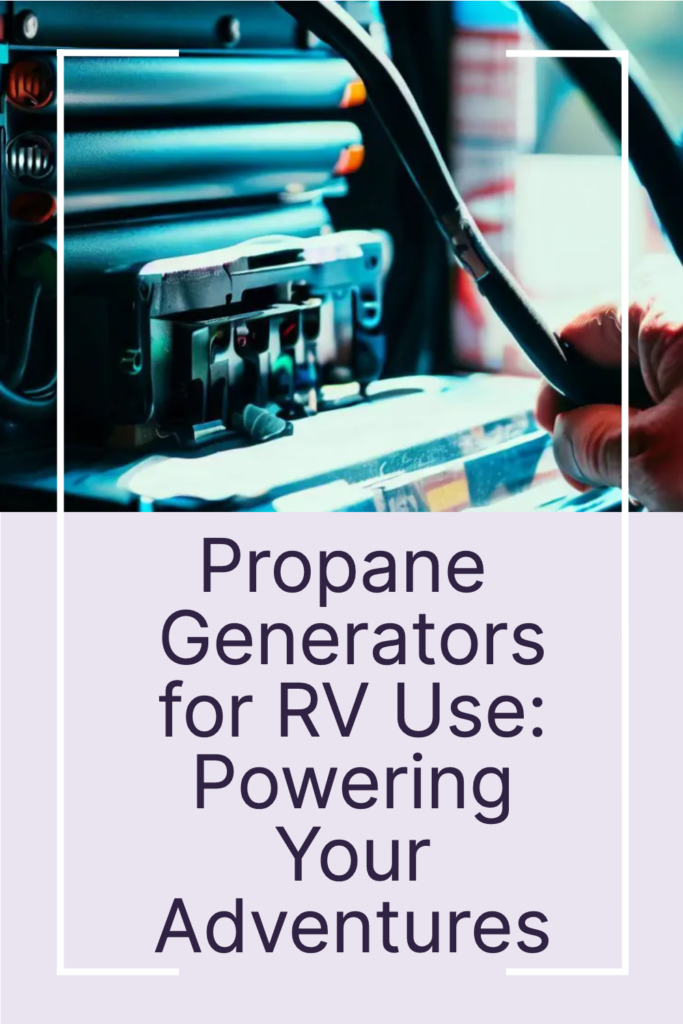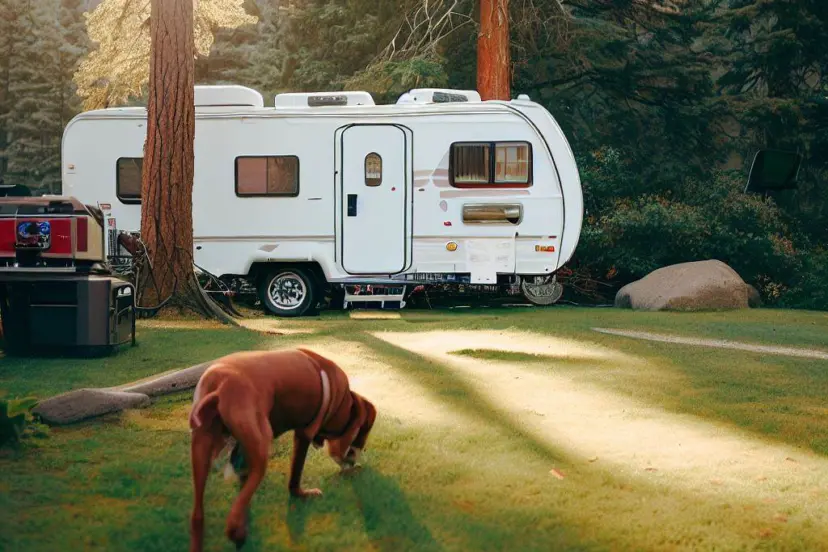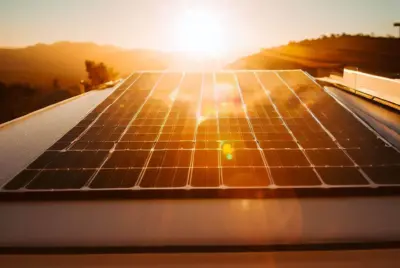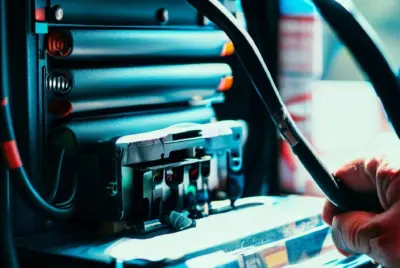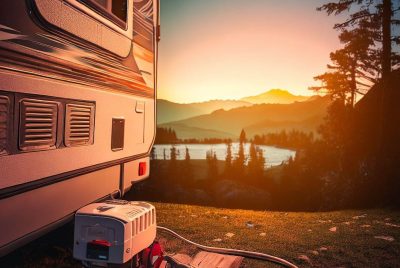Propane Generators for RV Use: Powering Your Adventures
When it comes to RV travel, having a reliable source of power is crucial for operating appliances, running the air conditioner, and enjoying the comforts of home on the road. Propane-style RV generators offer a versatile and efficient solution, providing the necessary power to meet your needs while being compatible with popular fuels. In this comprehensive guide, we’ll explore the world of propane generators for RV use, covering everything from how much power output and generator capacity to maintenance tips and popular fuel options. Whether you’re a seasoned RV owner or new to the RV lifestyle, this article will provide valuable insights and helpful tips to ensure you have enough power to fuel your adventures.
How Do Propane Style RV Generators Work?
As an avid enthusiast and advisor of RV camping, I’m excited to share my knowledge about RV generators. If you’re considering equipping your RV with a reliable power source, a propane generator is an excellent choice. In this article, I’ll walk you through the inner workings of propane generators for RVs and highlight their benefits for your camping adventures.
Understanding the RV Generator that Runs on Propane
An RV generator using propane operates on the principle of converting propane fuel into electrical energy. It consists of three main components: the engine, alternator, and fuel system. Fueled by propane, the engine powers the RV generator and drives the alternator. The alternator, in turn, converts the mechanical energy from the engine into electrical energy.
The Advantages of Propane Generators for RVs
Propane generators offer several advantages, making them ideal for RV campers. Firstly, propane is a clean-burning fuel, which means it produces fewer emissions compared to gasoline generators. This is not only environmentally friendly but also ensures that you can enjoy fresh air during your camping trips without compromising nature.
Secondly, RV propane generators are generally quieter than their gasoline counterparts. This is beneficial for both you and your fellow campers, as it allows for a peaceful camping experience without the constant noise of a generator humming in the background.
Fuel Efficiency and Convenience
One of the significant advantages of the RV generator using propane is its impressive fuel efficiency. Propane has a higher energy content than gasoline, which means you can run your generator for longer durations on a single propane tank. This is particularly useful during extended camping trips when refueling opportunities might be limited.
Moreover, propane is readily available at most campsites, making it convenient to replenish your fuel supply. You can easily connect your RV’s propane tank to the generator, eliminating the need for additional storage or transportation of fuel.
Maintenance and Safety Considerations
Maintaining a propane generator for your RV is relatively straightforward. Regular inspections, oil changes, and air filter cleanings are necessary to ensure optimal performance. Additionally, checking for any propane leaks and ensuring proper ventilation when operating the generator is essential.
When it comes to safety, these RV generators are designed with multiple built-in features such as automatic shut-off systems and carbon monoxide detectors. These precautions minimize the risk of accidents and provide peace of mind while enjoying your camping experience.
RV generators that run on propane offer a reliable and efficient power source for your camping adventures. Their ability to convert propane fuel into electrical energy ensures a steady supply of power for your larger RV appliances and devices. With their eco-friendly nature, quiet operation, fuel efficiency, and ease of maintenance, they are a valuable addition to any RV camping setup.
The Advantages of a Propane Generator for RV Use
Clean and Environmentally Friendly Energy
Using propane is a good way to reduce your environmental footprint while enjoying the great outdoors. Propane is a clean-burning fuel that produces fewer emissions compared to gasoline generators. By opting for a model like this, you contribute to cleaner air and help preserve the beauty of nature for generations to come.
Convenience and Versatility
One of the significant advantages is the convenience it offers. Propane is readily available at or near most RV campsites, making it easy to refuel your generator. Additionally, many RVs come equipped with built-in propane tanks, eliminating the need for extra storage or transportation of fuel. This convenience allows you to focus more on enjoying your camping adventures and less on fuel logistics.
Furthermore, these RV generators are versatile in their application. They can power various appliances and devices, including air conditioners, refrigerators, lighting systems, and entertainment equipment. With this type of RV generator, you can enjoy all the comforts of home while being on the road.
Reliable Power Source
Having a reliable power source is essential when you’re out in the wilderness. RV generators that run on propane provide a dependable and stable RV power supply. They are designed to handle the demands of multiple appliances simultaneously, ensuring that you never have to compromise on convenience or comfort.
How Long Can an RV Generator Run on a Full Tank of Propane?
If you’re considering a propane generator for your RV, here are some helpful suggestions and reasons to better understand the runtime of an RV generator.
Factors Affecting Runtime
Several factors come into play when determining how long an RV generator can run on a full tank. These factors include the generator’s fuel consumption rate, the propane tank’s size, and the generator’s powering load. Let’s dive deeper into each of these factors to gain a clearer understanding.
Fuel Consumption Rate
The fuel consumption rate varies depending on its make, model, and power output. Manufacturers usually provide this information in the generator’s specifications. It is typically measured in gallons per hour (GPH) or pounds per hour (LPH). It’s crucial to refer to the generator’s manual or consult the manufacturer to determine its specific fuel consumption rate.
Propane Tank Size
The size of the propane tank installed in your camper also plays a significant role in the RV generator’s runtime. RVs typically have propane tanks ranging from 20 to 40 pounds. The larger the tank, the more fuel it can store, which extends the generator’s runtime. However, keep in mind that your available space and weight limits may dictate the propane tank size you can install.
Estimating Runtime
To estimate the runtime of an RV generator, you can use a simple calculation. First, determine the fuel consumption rate in gallons or pounds per hour. Then, divide the total capacity of your propane tank by the fuel consumption rate. This will give you an approximation of the runtime in hours.
It’s important to note that the RV generator’s runtime can vary depending on its powering load. Higher loads typically result in increased fuel consumption and shorter runtime. Consider the appliances and devices you plan to run simultaneously and adjust your estimation accordingly. And most RVs and travel trailers can hook up via shore power, so you can operate your LP fuel tank when you are off-grid.
Optimizing Runtime
To maximize the runtime, you can employ a few strategies. First, be mindful of your RV power consumption and prioritize essential appliances. Running fewer appliances or reducing their power usage can significantly extend the fuel tank supply.
Another tip is to invest in energy-efficient appliances and LED lighting, as they consume less power. Also, proper maintenance, including regular oil changes and air filter cleanings, can optimize its performance and fuel efficiency.
What Size RV Generator Do I Need with Propane?
Assessing Your Power Requirements
Before determining the size of the RV generator you need, assessing your power requirements is crucial. Consider the appliances and devices you plan to power simultaneously in your RV. Make a list of essential items such as air conditioners, refrigerators, microwaves, TVs, and other electronic devices. Take note of their wattage or amperage requirements, which can usually be found in the product manuals or labels.
Understanding Generator Power Output
RV generators come with different power output ratings, typically measured in watts. The power output indicates the maximum amount of power the generator can provide. To determine the appropriate generator size, you’ll need to ensure that the total power consumption of your appliances and devices falls within the generator’s power output range.
Calculating the Total Power Consumption
To calculate the total power consumption, add up the wattage or amperage requirements of all the appliances and devices you identified earlier. Make sure to account for any additional power requirements, such as startup or surge wattage, which may be higher than the running wattage. Choosing a propane RV generator that can comfortably handle the total power consumption is important to avoid overloading and potential damage.
Sizing the RV Generator
Once you have calculated the total power consumption, you can select an RV generator with an appropriate power output. Generators typically come in various sizes, ranging from around 2,000 watts for smaller RVs to over 10,000 watts for larger motorhomes.
Choosing a generator with a power output that exceeds your calculated total power consumption is generally recommended. This provides a buffer and ensures the generator operates within its optimal range, promoting longevity and efficiency. Having a slightly larger generator also allows room for future additions or upgrades to your RV’s appliances and devices.
Selecting the right size for your recreational vehicle is crucial to ensure you have enough power to meet your needs while camping. Assessing your power requirements, understanding generator power output, and calculating total power consumption are key steps in determining the appropriate generator size.
Remember to choose an RV generator with a power output that comfortably accommodates your total power consumption, allowing for a buffer and future additions. Also remember that if you are enjoying RV living at a campsite you may have access to shore power and this can help limit the amount of gas you need. You can enjoy a reliable power source for all your adventures with the right size.
What Maintenance Is Required for a Propane Generator for RVs?
If you’re considering an RV generator, it’s essential to be aware of the maintenance requirements.
Regular Inspections and Maintenance Checks
 Regular inspections are crucial to identify any potential issues and ensure your RV generator is in good working condition. Inspecting the motor, fuel lines, and connections for any signs of wear, leaks, or damage is recommended. Additionally, check the exhaust system for obstructions and ensure proper ventilation to prevent the buildup of harmful gases.
Regular inspections are crucial to identify any potential issues and ensure your RV generator is in good working condition. Inspecting the motor, fuel lines, and connections for any signs of wear, leaks, or damage is recommended. Additionally, check the exhaust system for obstructions and ensure proper ventilation to prevent the buildup of harmful gases.
Performing maintenance checks, such as oil changes and air filter cleanings, according to the manufacturer’s guidelines, is essential for the generator’s longevity and efficiency. These routine maintenance tasks help maintain optimal performance and prevent potential problems down the road.
Proper Fuel Storage and Handling
Proper fuel storage and handling are key to maintaining the reliability of your equipment. Always store LP propane gas in a well-ventilated area, away from sources of heat or ignition. Inspect the tank for any signs of damage and ensure it is securely fastened to prevent leaks.
Following proper fueling procedures is important when connecting your gas tank to the generator. Check for any leaks or loose connections before starting the generator. In case of any suspected leaks or malfunctions, it’s best to consult a professional for repairs or assistance.
Exercise and Load Testing
Regularly exercising and load testing is crucial to keep it in top shape. Even if you don’t use the generator frequently, running it for a short period, typically 30 minutes, every month is recommended. This helps lubricate the engine and ensures its components remain in good working condition.
Load testing involves running the generator under a moderate load to ensure it can handle the power demands of your RV appliances and devices. This test helps identify any issues with the generator’s performance and allows you to address them before they become major problems.
Proper maintenance is essential for your RV generator’s reliable and efficient operation. Regular inspections, maintenance checks, proper fuel storage, and exercising the motor are key aspects of maintaining its longevity and optimal performance.
Following these maintenance practices ensures your RV generator is ready to power your RV during your camping adventures. Remember, a well-maintained generator provides peace of mind and allows you to enjoy a comfortable and worry-free camping experience.
Are Propane Generators for RVs Quieter Than Gasoline Generators?
If you’re considering a power source for your RV, one question that often arises is, “Are propane generators for RVs quieter than gasoline generators?” Here are some helpful suggestions and reasons to guide you in understanding the noise levels of an RV generator compared to gas generators or diesel generators.
The Quieter Choice: Propane Generators
These are known for their quieter operation compared to gasoline generators. Propane engines tend to produce less noise, resulting in a more peaceful camping experience. When you’re out in nature, enjoying the serenity of the surroundings, having a generator that minimizes noise disruption is invaluable.
Noise Reduction Benefits
The quietness of these bring several benefits. Firstly, they allow you to fully immerse yourself in the tranquility of the campground, allowing you to relax and enjoy the sounds of nature without the constant hum of a generator in the background. Whether sitting by the campfire, taking a hike, or enjoying some downtime, the reduced noise level ensures a more enjoyable experience.
Secondly, the quieter operation of this RV generator is considerate to your fellow campers. It helps maintain a harmonious camping environment where everyone can appreciate the peace and quiet. Whether you’re camping with family, friends, or in a communal campground, having a generator that doesn’t disturb others enhances the overall camping experience for everyone.
Considerations for Noise Levels
While an RV generator running on propane is generally quieter than gasoline generators, it’s important to note that noise levels can still vary among different models and brands. When choosing a propane generator for your RV, it’s advisable to research and compare noise level specifications provided by manufacturers.
Look for ones specifically designed for quiet operation, often referred to as “low-noise” or “quiet” models. These are engineered with noise reduction technologies and insulation materials to minimize sound output further. Selecting a model with lower noise levels can ensure an even more peaceful camping experience.
Embrace the quietness and tranquility. Experience the serenity of nature without the constant noise, and make your camping adventure truly unforgettable.
Is an RV Propane Generator Eco-Friendly?
Here are some helpful suggestions and reasons to guide you in understanding the environmental aspects of these RV generators.
Clean-Burning Fuel: Propane
These RV generators are considered more eco-friendly than other fuel options like a gas generator. Propane, also known as liquefied petroleum gas (LPG), is a clean-burning fuel that produces fewer emissions compared to gasoline or diesel. When propane is burned, it releases lower levels of carbon monoxide, nitrogen oxide, and particulate matter, which are harmful pollutants.
Using a propane generator for RV use, you contribute to cleaner air and help mitigate air pollution in the areas you visit. This benefits the environment and ensures a healthier and more enjoyable camping experience.
Reduced Environmental Footprint
Another aspect of the eco-friendliness of propane generators is their reduced environmental footprint. Propane is a byproduct of natural gas processing and petroleum refining. It is abundantly available and easily accessible, making it a more sustainable fuel option compared to fossil fuels like gasoline or diesel.
As portable generators go, these models are also more fuel-efficient compared to their gasoline or diesel fuel counterparts, meaning they can produce the same amount of power while consuming less fuel. This efficiency translates to reduced fuel consumption and lower greenhouse gas emissions, further minimizing your carbon footprint.
Considerations for Sustainable Camping
While these RV generators offer eco-friendly advantages, it’s important to consider other sustainable camping practices to minimize your overall impact. Some suggestions include:
Energy Conservation
Being mindful of your energy consumption is crucial. Turn off lights and appliances when not in use, use energy-efficient LED bulbs, and opt for natural lighting whenever possible. By conserving energy, you reduce the demand on your equipment and decrease fuel consumption.
Renewable Energy Sources
Consider incorporating renewable energy sources into your setup. Solar panels are an excellent option to harness the power of the sun and supplement your energy needs. Utilizing clean and renewable energy can further reduce your reliance on the RV generator.
These RV generators offer a more eco-friendly alternative for your power needs on the road. They contribute to cleaner air and a healthier camping environment with their clean-burning fuel and reduced environmental footprint.
To maximize your eco-friendliness, complement your usage with energy conservation practices and consider incorporating renewable energy sources into your RV setup. By adopting these sustainable camping practices, you can positively impact the environment and enjoy guilt-free RV adventures.
How Much Does a Propane Generator for RVs Cost on Average?
I understand the importance of budgeting and finding the right equipment for your RV adventures. Let’s discuss the cost factors associated with RV generators.
Cost Factors to Consider
The cost of an RV propane generator can vary depending on several factors. Here are some key factors to consider:
Power Output and Size
RV propane generators come in various sizes and power outputs to meet different needs. The larger the power output and size, the higher the cost. If you have a smaller RV requiring less power, you can opt for a smaller, more affordable generator. However, if you have a larger model like a 2 bedroom RV or require more power to run multiple appliances like a dishwasher or microwave, a larger and more powerful RV generator may be necessary, which can be more expensive.
Brand and Quality
The brand and quality of the propane generator can also impact the cost. Well-known brands with a reputation for reliability and durability may have a higher price tag compared to lesser-known or generic brands. Investing in a reputable brand ensures you’re getting a high-quality generator that will stand the test of time.
Features and Technology
An RV propane generator can come with various features and technological advancements that enhance their performance and convenience. RV generators with advanced features such as remote start, digital displays, and automatic power management systems may cost more than basic models. Consider the features that are important to you and align with your camping needs to determine the cost.
Average Cost Range
The cost of an RV propane generator can range anywhere from a few hundred dollars to several thousand dollars. Smaller RV generators with lower power outputs typically fall within the lower end of the price range, while larger and more powerful RV generators tend to be on the higher end.
You can expect to spend between $500 to $2,000 on average for an RV generator. However, it’s important to note that prices can vary based on the factors mentioned earlier, including brand, size, power output, and features.
While cost is an important consideration, it’s equally essential to prioritize quality and reliability. Investing in a reputable RV generator ensures you have a reliable power source during your RV camping adventures.
9 of the top propane RV generators
- Champion Power Equipment – Champion Power Equipment offers a range of reliable and affordable RV generators. Their top model, the Champion 3400-Watt Dual Fuel RV Ready Portable Inverter Generator, provides versatility with both propane and gasoline fuel options. It features a quiet operation, convenient electric start, and excellent power output for running essential RV appliances.
- Westinghouse – Westinghouse is known for its durable and efficient generators. The Westinghouse WGen7500DF Dual Fuel Portable Generator is a top choice for RVers. With a powerful 7500 running watts and the ability to switch between propane and gasoline, this generator provides ample power for larger RVs and is equipped with features like remote start and long run times.
- Honda – Honda is renowned for its reliable and high-quality generators. The Honda EU2200i Companion Inverter Generator is a popular choice for RV enthusiasts. Although it runs on gasoline, it can be easily converted to use propane with a conversion kit. This compact and lightweight generator delivers clean and stable power, making it ideal for sensitive electronics.
- Generac – Generac offers a range of propane generators suitable for RV use. The Generac 6864, also known as the iQ2000, is a portable inverter generator that provides quiet and efficient power. While it runs on gasoline, it can be converted to propane using a conversion kit. With a compact design and user-friendly features, it is a reliable choice for RV camping.
- Duromax – Duromax produces durable and powerful RV generators. The Duromax XP12000EH Dual Fuel Portable Generator stands out as a top model. With a robust 12,000 running watts and the ability to switch between propane and gasoline, it offers ample power for larger RVs and comes with a variety of outlets and features for versatility.
- Sportsman – Sportsman offers budget-friendly RV generators for camping. The Sportsman GEN4000LP is a top choice for those looking for an affordable option. This generator runs solely on propane and provides reliable power for basic RV needs. It is compact, lightweight, and easy to transport, making it suitable for smaller RVs or as a backup power source.
- Firman – Firman generators are known for their quality and performance. The Firman H03652 Dual Fuel Portable Generator is a highly rated model for RV use. It offers flexibility and reliability with 4550 running watts and the option to use either propane or gasoline. This generator features a convenient electric start, quiet operation, and various outlets for easy connectivity.
- Pulsar – Pulsar offers a range of RV generators. The Pulsar PG2000iS Dual Fuel Portable Inverter Generator is a compact and efficient choice. It runs on both propane and gasoline, providing versatility and extended run times. With a low noise level and clean power output, it is ideal for powering sensitive electronics in your RV.
- WEN – WEN generators are known for their affordability and reliability. The WEN DF475T Dual Fuel Portable Generator is popular for RV owners. With 4750 running watts and the ability to switch between propane and gasoline, it provides sufficient power for most RV needs. It features a wheel kit for easy portability and a range of outlets for convenient connectivity.
When selecting a propane generator for your RV, consider factors such as power output, fuel versatility, runtime, noise level, and overall quality. Additionally, it’s important to choose
Conclusion
In conclusion, propane generators for RV use are an excellent choice for providing reliable power during your RV adventures. With their compatibility with popular fuels, quieter operation, and efficient performance, propane generators offer the perfect solution for running your appliances and keeping your RV powered up on the road.
By understanding the power output and generator capacity needed for your specific RV, adhering to proper maintenance practices, and selecting a quality propane generator from reputable brands, you can ensure that you have enough power to fuel your RV travels and create unforgettable memories along the way.
FAQs about Propane Generators for RV Use:
- Can I use a propane generator while driving my RV?
- Yes, you can use a propane generator while driving your RV. However, it’s important to ensure proper ventilation to prevent the buildup of carbon monoxide. Consider installing a venting system or opening windows for sufficient airflow.
- Can I connect my propane generator to my RV’s existing propane system?
- In most cases, you can connect your propane generator to your RV’s existing propane system. However, it’s crucial to consult a professional or refer to the manufacturer’s instructions to ensure proper installation and avoid any potential safety hazards.
- Are propane generators for RVs safe to use?
- Propane generators for RVs are generally safe to use when operated correctly. It’s important to follow safety guidelines, such as keeping the generator a safe distance from the RV, ensuring proper ventilation, and regularly inspecting the generator for any issues or leaks.
- How long can a propane generator run continuously on a single tank?
- The run time of a propane generator on a single tank depends on factors such as the generator’s fuel efficiency, power output, and the size of the propane tank. On average, a propane generator can run continuously for several hours to even a few days on a full tank, depending on the load and usage.
- Can I use a propane generator to power my RV’s air conditioner?
- Yes, you can use a propane generator to power your RV’s air conditioner. However, larger RV air conditioners require more power, so it’s important to ensure that the generator you choose has a sufficient power output, measured in starting watts and running watts, to handle the air conditioner’s load.
Please note that the answers provided here are general guidelines, and it’s always recommended to refer to the specific instructions and guidelines provided by the manufacturer of your propane generator and RV.
